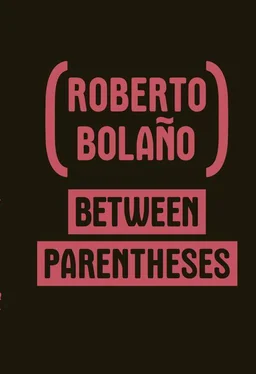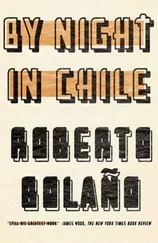Roberto Bolaño - Between Parentheses - Essays, Articles and Speeches, 1998-2003
Здесь есть возможность читать онлайн «Roberto Bolaño - Between Parentheses - Essays, Articles and Speeches, 1998-2003» весь текст электронной книги совершенно бесплатно (целиком полную версию без сокращений). В некоторых случаях можно слушать аудио, скачать через торрент в формате fb2 и присутствует краткое содержание. Год выпуска: 2011, Издательство: New Directions, Жанр: Публицистика, Критика, на английском языке. Описание произведения, (предисловие) а так же отзывы посетителей доступны на портале библиотеки ЛибКат.
- Название:Between Parentheses: Essays, Articles and Speeches, 1998-2003
- Автор:
- Издательство:New Directions
- Жанр:
- Год:2011
- ISBN:нет данных
- Рейтинг книги:4 / 5. Голосов: 1
-
Избранное:Добавить в избранное
- Отзывы:
-
Ваша оценка:
- 80
- 1
- 2
- 3
- 4
- 5
Between Parentheses: Essays, Articles and Speeches, 1998-2003: краткое содержание, описание и аннотация
Предлагаем к чтению аннотацию, описание, краткое содержание или предисловие (зависит от того, что написал сам автор книги «Between Parentheses: Essays, Articles and Speeches, 1998-2003»). Если вы не нашли необходимую информацию о книге — напишите в комментариях, мы постараемся отыскать её.
The Savage Detectives
Between Parenthese
Between Parentheses: Essays, Articles and Speeches, 1998-2003 — читать онлайн бесплатно полную книгу (весь текст) целиком
Ниже представлен текст книги, разбитый по страницам. Система сохранения места последней прочитанной страницы, позволяет с удобством читать онлайн бесплатно книгу «Between Parentheses: Essays, Articles and Speeches, 1998-2003», без необходимости каждый раз заново искать на чём Вы остановились. Поставьте закладку, и сможете в любой момент перейти на страницу, на которой закончили чтение.
Интервал:
Закладка:
And so any fantasy about a heroic or at least eccentric woman taking a solitary stance was shattered, as everything is shattered in Chile, and herein perhaps lies the country’s charm, its strength: in its insistence on sinking when it could soar and soaring when it’s hopelessly sunk. In its taste for bloody paradoxes. In its schizophrenic reactions.
Maybe that’s why there are so many writers in Chile, I say to myself. Because here, as I confirm on a daily basis, everybody writes. A writer publishes just one collection of stories at a bottom-tier publishing house and he’s got an ad in one of the newspapers or magazines, and out of nothing comes another writing workshop, full of young people and people no longer so young, all eager to face up to the mystery of the blank page. This is how writers make a living, of course. Most don’t make much, but there are some who rake it in. People flock to these workshops (it scares me to think how many there must be up and down the Republic) in the same frame of mind in which some New Yorkers go to see a therapist. Not desperate, but close. Not calm, but close. They aren’t tightrope walkers, but when it comes to teetering on the brink of the abyss — an abyss that seems more Latin American every day — they manage to keep their balance, a precarious balance that is in some sense deeply pathetic, but also heroic.
Of course, not everybody limits themselves to attending workshops. Some are also in therapy. One very dear friend, during dinner at a restaurant, told me about her psychoanalyst, who turned out to be none other than Norman Mailer’s daughter. Another friend (a writer, and not a bad one, either) was listening and said that he was in therapy with Norman Mailer’s daughter too. Almost instantly, another girl jumps in and says the same thing. For a moment I thought they were kidding me. Everyone had drunk lots of pisco and I hadn’t touched anything because I can’t drink anymore, but the sense I got was that I was the only drunk person in the room. Norman Mailer’s daughter is a psychoanalyst and she lives in Chile? Hard to believe. But it’s true. What could possibly bring Norman Mailer’s daughter to Chile? If we were in Mexico, it would make more sense: there’s a tradition of outrageousness there that encompasses a sub-genre of bizarre visitors. But not in Chile. And yet Norman Mailer’s daughter lives here and has been seeing these people for a while now. So is she any good? I ask. My friend says she’s very good, although I don’t think she sounds very convinced. The writer says sometimes she’s good and sometimes she has no clue. But why did she come to live in Chile? I ask, on the verge of tears. No one knows.
Jorge Arrate, as far as I know, isn’t in therapy. But he hasn’t been able to avoid writing workshops. Somebody told me the story of how he met Diamela Eltit. She ran a workshop and he decided to enroll. At first he came at the scheduled time, like everyone else in the group, except that Arrate had a chauffeur and an official car since he was already a minister. Then one day he came half an hour early. And another day he came an hour early. And finally he came three hours early. And while they were waiting for the workshop to begin — while Diamela, I suppose, wrote or cooked or ironed her son’s clothes — Arrate would sit himself down in a chair in her house, which is where writers hold their workshops, and talk to her about literature. I like to imagine them like that, Jorge sitting and Diamela ironing and every so often giving him one of those Diamelian looks, at once brooding and innocent, and talking about her writing, which is as complex as anything you’ll come across in Spanish today, and probably also about other people’s work, books by women, avant-garde texts, works that Arrate, a socialist and an exile forged in fights where such things had no place, wasn’t familiar with and that from then on he set to reading with passion and humor — the same passion and humor that he brings to everything he does — and also with the boldness of love. After a while he was dating Diamela, contemporary Chilean literature’s most maudit writer, and then, basically, as sometimes happens, they moved in together.
Then the bodyguards disappeared. But what if one night you’re attacked by some group from Patria y Libertad? I asked for the hundredth time, ready to eat my dessert and go. I can only hope they don’t have my address, says Arrate. Never had a house seemed more vulnerable to me. The room where Diamela writes overlooks the yard and is big and full of books. Arrate’s office, meanwhile, is small, with photographs on the walls: most are of two kids, Jorge’s children, who live in Holland, others are of legendary leftist figures, a brief frozen history of lost dreams. At some point during the night we talk about Carson McCullers and her unhappy husband who wanted to write and couldn’t. Diamela knows McCullers’s work very well. Arrate, joking, says that he, a former writing workshop participant, has something in common with McCullers’s husband. I suppose he’s referring to his literary efforts. I don’t know. I’ve never read anything by Arrate and I probably never will. But he’s right about one thing: Carson McCullers’s husband fought in World War II and he was brave, and Arrate fought in the disastrous little wars of Latin America and he’s brave. Brave like Allende’s former comrades. In other words, stoically brave. But I don’t tell him that.
Chilean writers, real or aspiring, are hopeless. That’s what I’m thinking as, late that night, I leave the house where Diamela and the minister live, and outside we say goodbye to Pablo Azócar, who wants to leave Chile as soon as possible and never quite manages to go and finally is lost; that’s what I’m thinking as Lina, Carolina, and I wave goodbye on a dark street in the neighborhood that produced so many illustrious gladiators.
And that’s what I’m thinking when I talk late one night to Pedro Lemebel, one of Chile’s most brilliant writers. It’s his birthday. Lemebel — born in the mid-fifties, according to him, although I think he was born in the early fifties — has published four books ( Incontables [Countless], 1986; La esquina es mi corazón [The Corner Is My Heart], 1995; Loco afán [Wild Desire], 1996; and De perlas y cicatrices [Of Pearls and Scars], 1998), and for some time, a pretty shitty time, as it happens, he was one of two members of the group Las Yeguas del Apocalipsis or The Mares of the Apocalypse, whose name is an accomplishment in itself and whose survival was something like a miracle.
Who were the Yeguas? First and foremost, the Yeguas were two penniless homosexuals, which in a homophobic and hierarchical country (where being poor is an embarrassment, and being poor and an artist is a crime) was almost an invitation to abuse, in every sense of the word. Much of the honor of the real Republic and the Republic of Letters was saved by the Yeguas. Then came the rift and Lemebel began his solo career. There is no battlefield on which Lemebel — cross-dresser, militant, third-world champion, anarchist, Mapuche Indian by adoption, a man reviled by an establishment that rejects the truth he speaks, possessor of a painfully long memory — hasn’t fought and lost.
In my opinion, Lemebel is one of Chile’s best writers and the best poet of my generation, though he doesn’t write poetry. Lemebel is one of those few who doesn’t seek respectability (the respectability for which Chilean writers would sell their own asses) but freedom. His contemporaries, the hordes of right-leaning and left-leaning mediocrities, glance at him over their shoulders and try to smile. He isn’t the first homosexual, god knows, of the Chilean Parnassus, with all its closeted queers, but he’s the first cross-dresser to appear on stage alone in the glare of the footlights, addressing a literally stupefied crowd.
Читать дальшеИнтервал:
Закладка:
Похожие книги на «Between Parentheses: Essays, Articles and Speeches, 1998-2003»
Представляем Вашему вниманию похожие книги на «Between Parentheses: Essays, Articles and Speeches, 1998-2003» списком для выбора. Мы отобрали схожую по названию и смыслу литературу в надежде предоставить читателям больше вариантов отыскать новые, интересные, ещё непрочитанные произведения.
Обсуждение, отзывы о книге «Between Parentheses: Essays, Articles and Speeches, 1998-2003» и просто собственные мнения читателей. Оставьте ваши комментарии, напишите, что Вы думаете о произведении, его смысле или главных героях. Укажите что конкретно понравилось, а что нет, и почему Вы так считаете.












